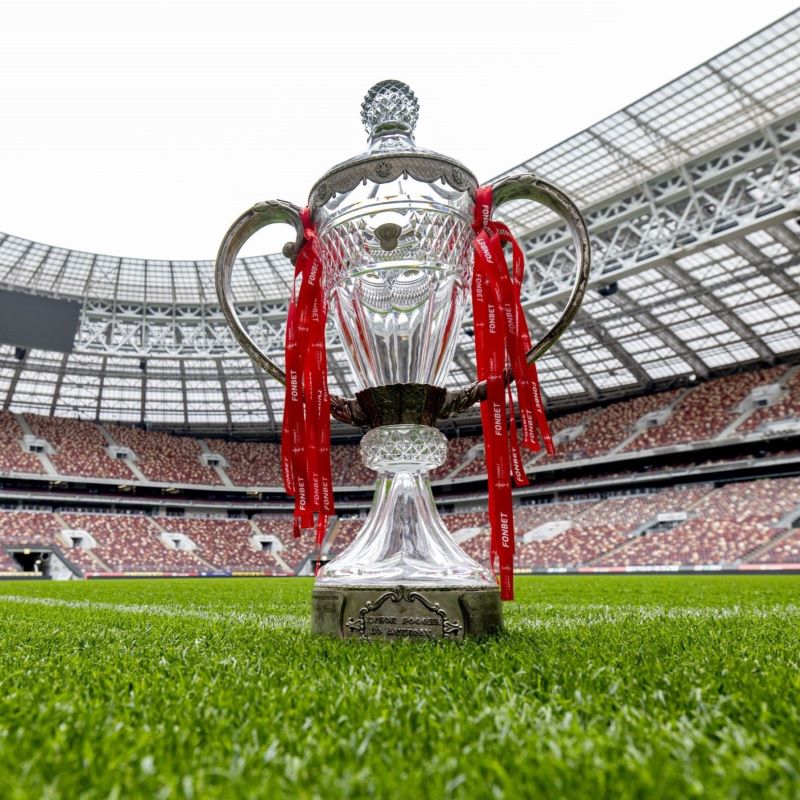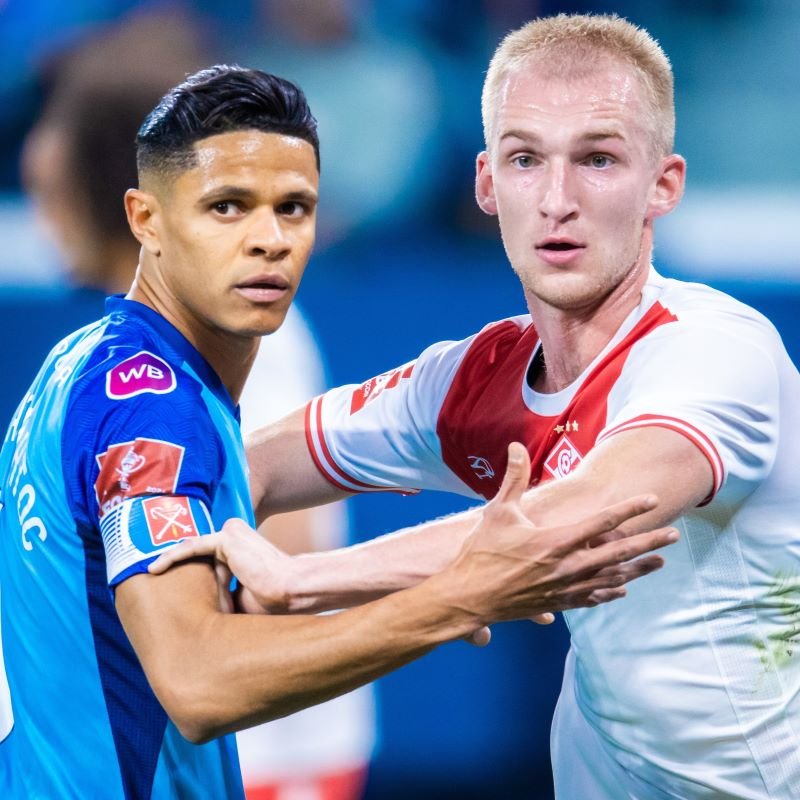We continue our series League of Pros - stories of people who work in our football and make it better.
Timur Bayramov came to work in football after graduating from university. He was both a press officer and an assistant to the president at a second division club. Since 2018, he has been responsible for social networks; first at Rubin, now at Lokomotiv, and has run accounts not only for Russian Premier Liga clubs, but also for the league itself.
“When I first went to football, I didn't see a goal - I was wiping a chair at the stadium”
"I grew up in Kazan and became interested in football as a child. The city was not yet a sports capital, as it is now called after the Universiade, water sports World Championships and the FIFA World Cup. I had a childhood dream to study professionally, and even attended a couple of classes in the football section, which was located in a neighboring school, but it didn't work out anymore. Until I was 10-11, I still watched hockey and basketball, and I also knew the teams of Ak Bars and UNICS, but over time my interest in them decreased, and only football remained.
When I realised that I would not be able to play sports professionally, I began to actively buy newspapers and magazines. There was the colorful ‘My Football’, and the weekly magazine ‘Sovietsky Sport. Football’. I really enjoyed reading and following the statistics, but my favorite part was studying the lineups. Actually, I started watching football in 1999, when I was six years old. Back then only Spartak were shown on TV, so I supported them a little.
In June 2001, my uncle suggested me to go to the Centralny Stadium, when Rubin were playing against Kristall. I didn't know what Rubin and the first league were. In the program, it was even written that Kristall were coached by Kurban Berdyev. I don't remember exactly who ended up sitting on the bench, either he or Vitaly Kafanov, but after some time Berdyev moved to Kazan [Rubin played with Kristall on 13 June, Berdyev signed a contract with the Kazan club on 3 August - Premierliga.ru].
I still remember that Rubin won and Evgeny Dyachkov scored in the third minute, but I didn't see the goal. I turned away from the pitch to wipe the chair, and when everyone started shouting, I turned around - it turned out to be a goal. At the same time, in the first league, matches were not filmed, there were no replays. But I keep the program from the match at home. When I was working at Rubin, I liked to tease the former press attache that it had a typo in the name of Berdyev - not Kurban, but Kruban.
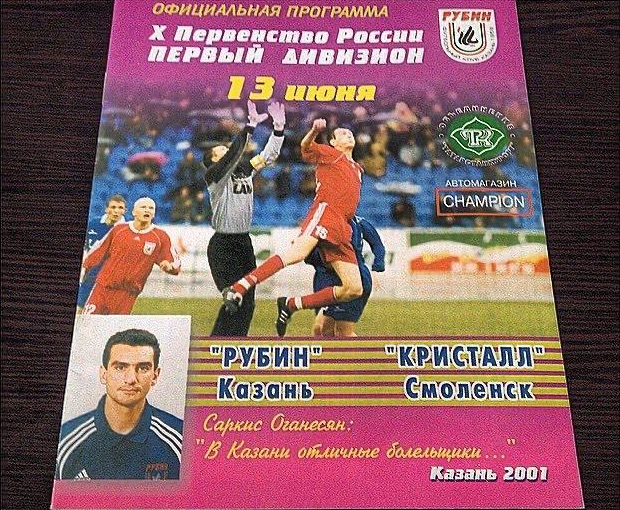
I also remember Roman Sharonov from the 2001 squad. In that game against Kristall, he didn't cross the halfway line at all. I didn't really understand football at that time, so I asked my uncle why. That's how I was told what a libero was. When Sharonov was coach of the Rubin youth team, we played at the training ground with the club's employees, and Roman Sergeevich explained to me some of the skills of playing in defence. I immediately had a flashback: back in 2001, I had learned from his example about the libero position, and now he was explaining to me how to perform it correctly.
The striker Vladimir Bayramov was also playing for Rubin, and I have an unusual patronymic for a Tatar: Vladimirovich. When I was a kid, I used to say half-seriously about him: "Oh, this is probably my dad." Then I considered that at the time of my birth, he was only 13 years old - I realised that it didn’t add up. I even had a picture of him on my old phone after some veterans’ match. I approached him then: "Vladimir, hello, my name is Timur, and my patronymic is Vladimirovich". He immediately tensed up - evidently, he thought I was claiming something. We laughed and exchanged a few words.
“I worked at Rubin for six months for free, but my eyes were burning”
I studied at university with a degree in information security, but somewhere in the third year I realised that I did not want to do this. However, my favorite time was graduation. My best friend and I shared a topic: I was supposed to listen in on the phone, and he was supposed to stop me. I then defended my diploma with the highest honours, and one German library even wanted to buy my work, but in the end I sent a letter to the scientific supervisor so that he could decide for himself. Only then did I realise why the Germans were interested; there were no works on my topic on the Internet at all.
After graduation, I accidentally found out on Twitter that Rubin had a vacancy in the press office, so I submitted a CV. They seemed to like me, but for some organisational issues I could not get a job on the staff. I also edited wedding videos for a very long time: my friend shot weddings and threw me materials. Basically, I earned my way by charging about five thousand rubles for a two-hour video.
At Rubin I had the usual functionality of a press office employee. For example, I conducted online broadcasts on Twitter. We didn't have much creativity, but we were probably one of the first to present our lineups with a layout, not a text or a photo of the team sheet, and to create creative posters to make social networks more colorful. I don't remember where it came from, but somehow we decided to start. I even interviewed players from the youth team. This is how I met Ilzat Akhmetov, with whom I still communicate. He was 15 years old, but I tell everyone that even then I believed in him. He really stood out among all the players, and thank God, he did it.
I also wrote reviews of the opponent in the programs. Given that I knew the lineups, it was easy for me to figure out who was a strong or weak player, who was coming or going. As it turned out, I was employed for six months working for free, but my eyes were burning. You could say that then I found a dream: to get into a football club, to see everything from the inside, and I went to work for it. I was not ready to go anywhere, and no other spheres attracted me.
After a six-month internship at Rubin, I was hired by a company that outsourced marketing at the club, but I continued to perform the same functions as a press officer, plus I helped organise events. For example, there was a presentation of players at an aircraft factory, since Rubin was originally a factory team. I was also the host of a club program on Sport FM radio. We did not work this way for long: in September 2015, the club's management changed, head coach Rinat Bilyaletdinov left, and the contract with our company was terminated. I could no longer get a job at Rubin, or rather it was dragging on again, and I went to the online newspaper BUSINESS Online to stay in football.
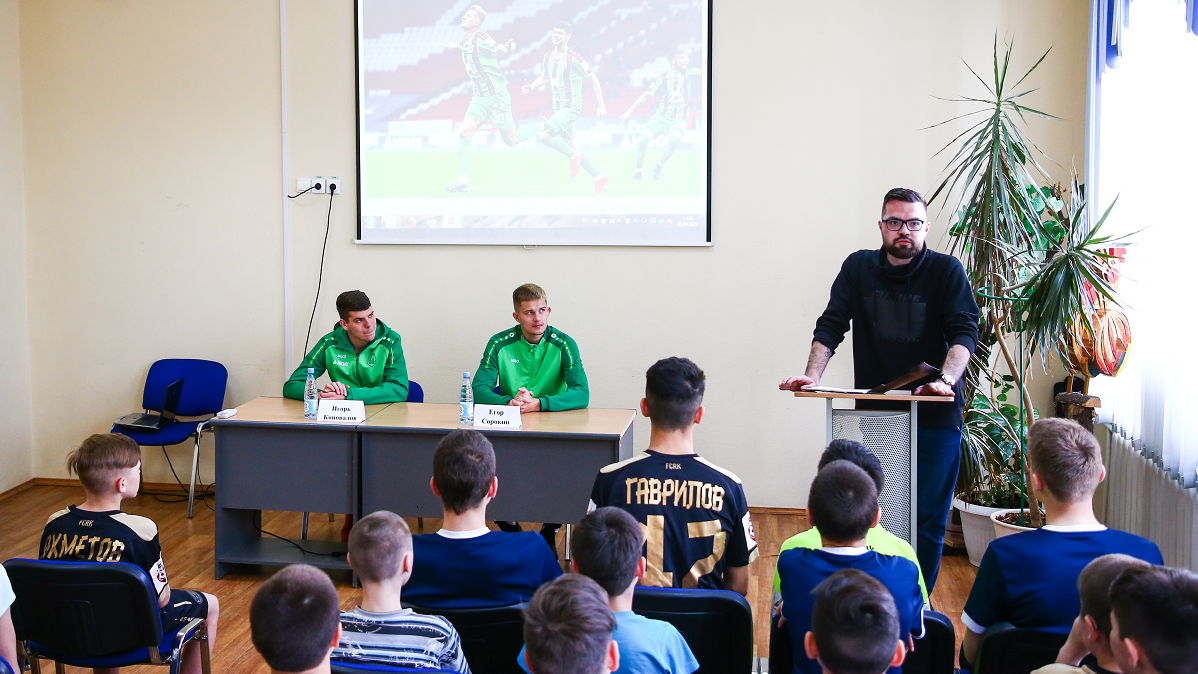
Connections with the club helped a lot in journalism. The team staff knew me, there was no suspicion of me; we had crossed paths for a year before, and my colleagues understood that I was not looking for scandals. When I went from the newspaper to the training camp in Spain, the players and staff were not afraid of me. They knew that if they told me something that wasn't for publication, it wouldn't be in the paper tomorrow. I either didn't tell the editorial board, or I said that there is such information, but we can't publish it yet.
I've always enjoyed doing interviews. One of the most interesting characters I remember, for example, is Yuri Utkulbaev, a fairly open speaker. Once he was a coach of the Rubin youth team, but now he trains Neftekhimik. We had a pleasant conversation with Sergey Kozko, who now trains goalkeepers at Rubin, and in those years worked with Utkulbayev in Kazakhstan. It also brought back memories from my childhood when he was still playing for Rubin. I even talked to him a little with a sinking heart.
I particularly enjoyed Moritz Bauer. I've always said that Europeans are different people: some Russian football players have a slight disdain for journalists, and with Bauer it was as if you were sitting with a friend. I was also impressed by this moment: football players usually fly to the Maldives for a vacation, and Moritz told me how during his vacation he went to Iceland or got a pilot's license. It's just a shift in the stereotype that football players do these things. We also need to add Emil Bergstrom - a guy with the kindest soul.
“The RFU Commission came, and I was sweeping leaves - there was no one else”
One of the interviews for the newspaper then led to a job at Junior football academy. In fact, this was a commercial story: we had to talk about this academy, and we decided to do it in the form of an interview with the director of the Kazan branch, Konstantin Tarasov. I really didn't want to go to this interview, but I was forced to. In the end, this resulted in the fact that after a while I wrote to Tarasov: "Is there any work for me?” As it turned out, there was. I wanted to work in football, but it didn't work out at Rubin; I didn't like journalism in the end. I began to understand that it wasn't really about football, and Junior became a new alternative - one of the only ones at that time.
At first, I worked as a development director at the school, and in the summer of 2017, Tarasov decided to create a team in the second division Anzhi-Junior and appointed me as his assistant, as he considered me competent in a number of issues. The entire document flow went through me: I was responsible for the registration, licensing of the stadium, the team, and a little bit for selection.
I did everything calmly. It's funny: I was 24 years old, and a director of a football club - imagine my emotions at that moment. Even though it was in the second division, I didn't get paid for six months and am still yet to, but the burning eyes paid off. Then the money at the club began to run out, people worked less and less, and I had to deal with the application of players and contracts. There were just the two of us left from the administrative headquarters; myself and Konstantin's friend Rustem Valeev. Both of them understood that the team would close at the end of the year, but they decided to finish the work. They didn't want to quit just like that.
I'm more than happy that this has happened in my life. For example, if you ask me to register a football player or license a stadium or team, I will do it without any problems. In the RPL, in the PFL; the procedure is the same. This has helped me from time to time at Rubin. I got invaluable experience, because I did serious things, even if the team only played in the second division and eventually collapsed.
There was a funny moment. The RFU Commission came to us, and I was sweeping the coaching area from fallen leaves at the stadium. There was no one to do it, but I wanted to show the Commission that everything was beautiful. We tried to do as much as we could, but it all came to nothing in the end. However, we still communicate with some players, and I have excellent relations with Mr. Valeev, who now works at Neftekhimik hockey club.
“In the story with Sharonov, everything worked out as cool as possible”
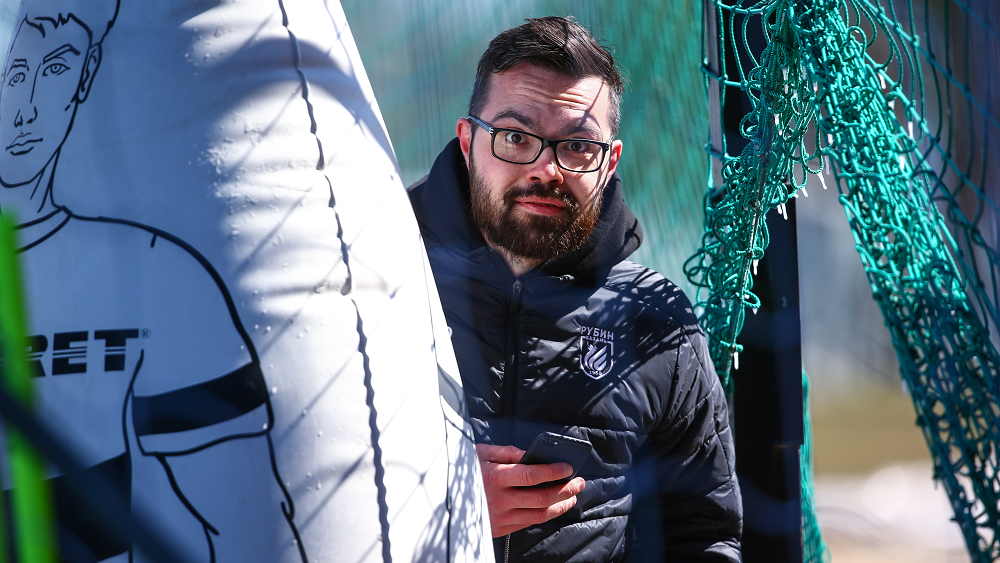
After leaving Anzhi-Junior, I did various things so as not to be out of work: I sold meat in a friend's shop, and helped a construction team at a kindergarten. When the press office of Rubin was headed by Ivan Bodylevsky - we had mutual acquaintances - I wrote to him that I was ready to work at the club, and asked if there were options. He asked me what I could do, and eventually gave me social media.
Before that, I almost didn’t follow how social media works in football clubs, so I created an account, subscribed to 250 different clubs from European and American leagues, and watched what they were doing. If I liked something, I thought about repeating it at Rubin, but with the addition of something of my own. Over time, I formed my own templates in my head that could be used on club pages. There aren't any guidelines for running social networks: you look at what others are doing, try to come up with something completely new, and eventually form your own idea.
At that time, I already understood that social networks should be taken seriously. I'm still convinced that social networks are the face of the club, and you can't behave like a jerk. Fortunately, this idea has always been shared by my managers. Everyone says for some reason that I was inspired by Enisey and Stas Merkis [former head of the club's press office - Premierliga.ru], but in fact I remember how Zenit did everything precisely - when they made fun of, for example, the Daily Mail. I liked it so much that I wanted to move it to Rubin, and I kept waiting for the right moment.
The funny thing is that it came precisely in the match with Zenit. We then sensationally won in St. Petersburg [2-1 in December 2018 - Premierliga.ru], and three 18-year-old academy graduates played - it was a completely unexpected victory. That was the first time we managed to do something global. Oleg Shatov was on his knees, and in front of him was a Gazprom banner, and we posted a photo with the caption: "Not all dreams come true." Zenit still like to use the hashtag "city of winners", and we posted the same one about Kazan. It was just a simple jibe, but then I realized that this scheme works if you use it wisely at the right time. After all, I run a football club account, not a comedy one. Everything should be in moderation.
I remember the story of Roman Sharonov and Metallica with warmth. This was one of the best cases that our team managed to make, because everything worked as smoothly as possible. It was unusual in general for Russian football and unusual for Rubin; the club had not been particularly noticeable in such things before. When we were planning t-shirts about Sharonov, we didn't think about earning money: "We will sell 20 and it will be good." In the end, we shifted eight batches of 50. It was worn by Vasily Utkin, it was shown on the ‘Krasava’ YouTube show - it was very well dispersed, and I was shocked by the result. It was nice to hear about Rubin, and I was involved in it.
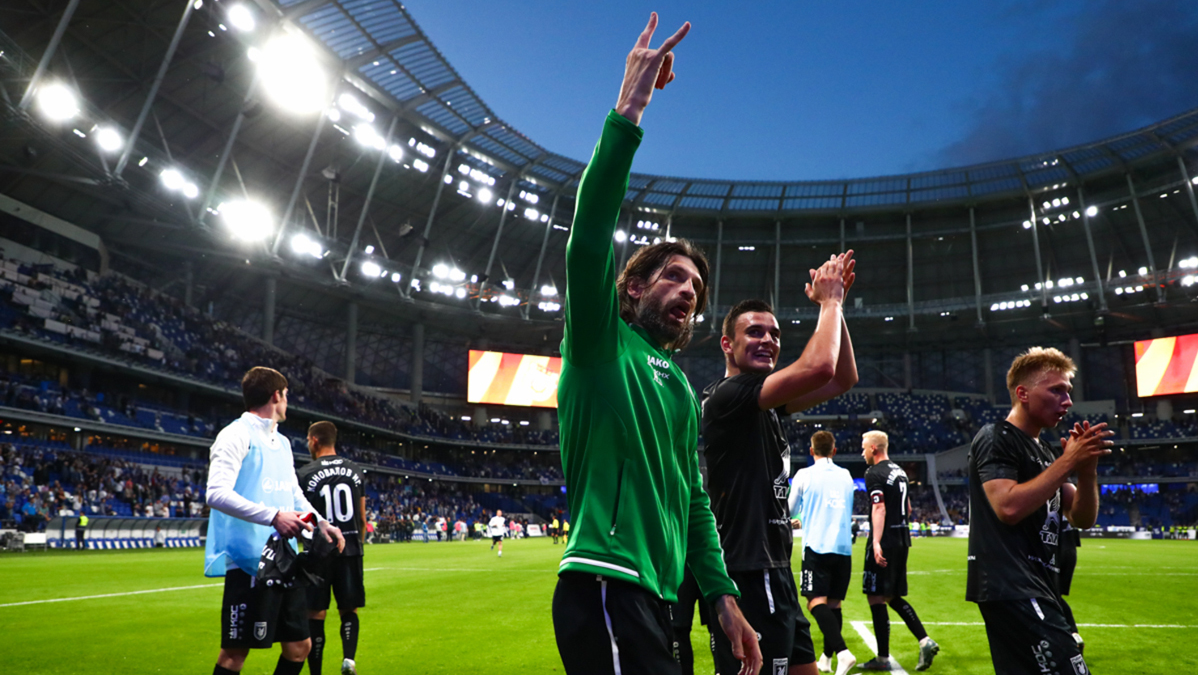
Here it is necessary to take into account the whole chain: if the fans have not come up with a banner, Sharonov had not shown a metal goat, the photographer had not been in the right place, the club store director had not responded to my request to make the shirts, the designer had not drawn the design, the girl from the commercial department had not issued all the paper, Vanya had not agreed with Sharonov. Only from the outside it seems that they just came up with it and did it, and if there was a failure somewhere, nothing would happen. Personally, I didn't keep this t-shirt as a souvenir: I had the opportunity, but I don't know why I didn't do it.
If we talk about working with players, in my memory there haven’t been any who could come up and offer some creativity themselves, but during the filming they can offer insight. At Rubin, there was a case when goalkeeper Ivan Konovalov and three Georgians - Khvicha, Zuriko and Beka - held a penalty shootout after training. Vanya won, and under the terms of the dispute, the Georgians had to wash his car. We took and filmed the whole process in the parking lot. This is not some kind of staged story: an ordinary post-training game turned into a video, and it did well on Rubin TV. We just happened to be in the right place, took the camera and went to shoot it.
When you work at a club, you already understand which players are easy to approach with a particular request, what can or cannot be removed; there is an internal censor. First of all, when you do something about another player or club, there should be nothing offensive. Secondly, there are coaching nuances: for example, we had a clear understanding that we always turned off the camera at training. We were never kicked out of sessions, but either the coaches still asked, or they themselves understood that these things should not be shown, because this is coaching, on which the result depends.
Third, you can't show anything that defames the brand's honor. It's one thing for a player to have a ball thrown between their legs in a square - it's a shame, but everyone is having fun. It’s something else entirely when you have done something humiliating, even if they have finished their career - you will not publish it. I understand that this would have taken off, but why discredit your player? You can't show that your team is playing, roughly speaking, a weak player.
“The overall level of social networks in the RPL and clubs has grown significantly”
While working at Rubin, I once saw a Facebook post by Leonid Shlykov from the RPL when he was looking for a social media developer and decided to respond, although I was not going to leave Rubin. It was just interesting to find out what it was. Leonid saw my work at Rubin, and it turned out that I could work remotely. I agreed, because I was sure that I could combine the two roles.
With the league, there were no problems with combining, and the club didn't know about it for a long time, until I got caught out - I put out a post on Rubin’s social network, not the RPL’s, just mixed up their Instagram accounts and didn't check. There was Yury Dupin, who had not yet moved to Rubin, there were his statistics for Anzhi. I very quickly deleted the post, but Vanya Bodylevski noticed it. He understood everything and did not object to continuing to combine both roles, but just asked me to be more careful. Although I hid my work for the league, in the end it was treated normally. In both places, my work was fine, so why break something?
The main difference between working with the RPL and the club was that at Rubin I had to create work myself, while at the RPL there was more work according to a plan. My main task was to find ways to present the material in a more interesting way. My club team still had a great designer, photographer, site administrator, and Vanya himself, but I was responsible for social networks myself. In the RPL, we had a large social media team: not only Leonid, but also Tanya Kokorina, plus three social media admins on duty.
Sometimes we came up with something creative, something that wasn't in the RPL accounts before. For example, we actively interacted with users in the 433 account public comments, and so introduced their large audience to the RPL. We tried to create Twitter feeds in order to attract both our clubs and fans there. In general, we did not limit ourselves exclusively to publishing match results, but created interesting content.
Tanya and Leonid, by the way, ought to take a bow for how they changed the RPL’s social networks, and the same applies to people at clubs. They all realise the importance of social networks, that this is the face of the brand, and that they must fight for it. The overall level of social networks at both the RPL and clubs has grown significantly, and it's interesting to follow them.
At the end of 2019, I wanted to change something. At Rubin, the guys and I implemented some cool cases: a Sharonov t-shirt, and we played Aleksey Sutormin's transfer several times - we managed to tell people that they can do something cool in terms of media in Kazan. I had a desire to go to the next level for myself, and when I saw a vacancy at Lokomotiv, I decided to write in. First, it was moving to a new city, and second, it is a different level of organised work - not better or worse than In Rubin, just different. I always adhere to the principle that it is necessary to try: I often respond to vacancies, and if they reply to me, I don't worry. I haven't been rejected before, or anything. I wanted to try Loko, and they took me on. Thanks to Kirill Breydo [Lokomotiv's director of public relations - Premierliga.ru] that he believed in me.
In addition, we will start in the Champions League in October. This is a completely new level. I've been involved in Europa League matches before, but only a little bit. In the RPL, you know with your eyes closed what will happen on the day of the match, but what the Champions League is, you want to experience for yourself. After all, there will be not only a Russian audience, but also a European one; perhaps you will be able to light up there and do something cool.
At Rubin, they treated it absolutely normally. I had concerns, but everyone supported me and said it was cool. We still have a great relationship; I recently flew with Loko to a match in Kazan, and we had a very warm conversation. Unfortunately, it was already more difficult to combine my work at Lokomotiv with the RPL, so I had to leave the league, but I still maintain excellent relations with all the guys I worked with during that time. Now at Lokomotiv I am responsible for accounts together with my colleague Guzel, so the club’s social media department has turned out to be a bit Tatar.
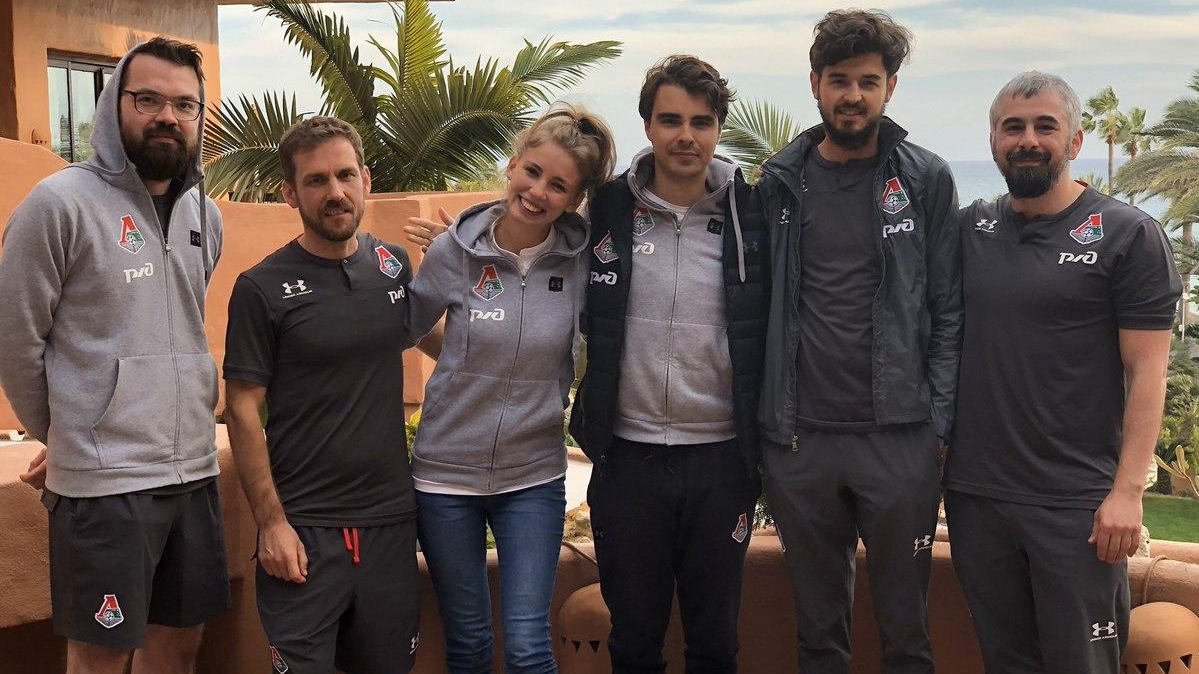
Timur Bayramov is the first one on the left
“The subscriber should always respond as far as possible”
When angry comments are written in the community, it all depends on what they are caused by. If the team is playing poorly, you understand that once again it is better not to meddle with entertainment things: whatever cool content you produce, it will be perceived in a negative light. You can try to offset some discontent with humor. People are generally surprised that brands can respond to them, they are still not used to it. The main thing is to show the person that on the other side of the screen is not a soulless machine, but the same person, and, of course, to help as much as possible in solving their problem.
It happens that people write in private messages with only "you" as the censor, and you respond to it culturally, politely and calmly. Many then have a sense of guilt, and the tone instantly changes. I am a supporter of the fact that you even have to work with the negatives. There are many different techniques, but everything is very situational. Social networks are generally a very situational story, because everything depends on the specific conditions, what is happening at the moment, what you can say, and what reason there is. You always need to take into account a huge number of factors, otherwise you can miss something that will turn against you later.
I understand what happens in the minds of fans when they see unpleasant news – for example, at Rubin I announced on social networks about the dismissals of Berdyev and Sharonov, and I can't blame subscribers for their reaction. Social networks, again, are the face of the brand, and are the first place where most people will come to express their opinion. I am against mercilessly banning subscribers; this is necessary in extreme situations when they use serious insults. But in general, in football, any fan is valuable. Maybe he was just in a bad mood. I will delete the comment if there are obscene words, but I will not ban the subscriber. If he writes so in a private message, I just answer politely. Usually, the subscriber should always respond as far as possible. Now is the time that you need to communicate constantly. It just seems that everything is easy, and interaction with subscribers is one of the most difficult tasks.
Sometimes I like to get into conversations where, at first glance, our response is not required. Recently I saw a post on Twitter of a girl who dreamed of being answered by the accounts of Lokomotiv, Rostov and Zenit, but could not remember what they talked about. From the club account I suggested: “Let's remember. Rostov, Zenit, join us.” In the end, all three clubs came together, and the girl was happy. Other readers saw that we made such a nice thing.
When Atalanta announced the transfer of Aleksey Miranchuk, we went to the club's Instagram and wrote “Buona fortuna” in the comments. This is how Atalanta fans found out about the club where their new player came from. This is one of the small details that make up our work, including building brand awareness.
“It is extremely rare that we learn about a transfer at the last moment”
During the match against Zenit itself, we learned that Lesha Miranchuk would say goodbye after the game, and colleagues from Loko-TV quickly put together a video that was eventually shown at the stadium. There was a lot of archive footage, and the guys know what is stored and where, and quickly put them together in a beautiful and kind video. The layout was also made for the match, but it was not prepared in advance. Then, in fact, we went to the training ground with Lesha, photographed his last day, and took interviews.
Although we knew that this moment would come, we did not prepare anything in advance, but we still had more urgent tasks. We thought we would start when we were told something like: "Guys, Lesha is going to Bergamo to sign a contract, get ready." But it so happened that I had to do everything abruptly during the match, for the first time in my memory. It was also the last chance to say goodbye to the fans, so we had to organise everything quickly.
Now it is extremely rare that we learn about a transfer at the last moment; sometimes it is a day before, sometimes even a week. Everything, as I like to say, is situational, but there is time to prepare. The guys at Lokomotiv last summer, when I was not yet at the club, made a cool presentation to Joao Mario in the shortest possible time, although they found out about the signing quite late.
Sometimes I find out about the transfer 40 minutes before the announcement. This is a standard story at the end of the transfer window. I remember the situation with Sharonov when he was appointed at Rubin as interim head coach. I was sitting in a cafe that day, there were rumours about the appointment, but the final decision was not yet made. Suddenly, the chief called me and said that I needed to announce it. The designer at this time was somewhere away, and right in the cafe I downloaded a photo of Sharonov on the internet, made a more or less presentable layout in photoshop with my own efforts, and it was announced. Since then, I have got used to carrying my laptop everywhere.
“You need to think clearly so that the joke doesn’t t turn into an insult”
Dima Barinov was touched by the actions that we carried out when he was injured. The guys came out in t-shirts with the wishes of the fans, then people recorded video messages. This idea was collective. Someone suggested that the players should come out in t-shirts, and I added that it was possible to collect comments from fans and make this story unusual, not just "Get well, Bara".
We selected the most original comments from Vkontakte, Twitter, and Instagram. Someone wrote a poem, another wrote it as beautifully as possible, and others used funny epithets. Thanks also to our outfitter Stas, who promptly applied the words on the day of the match, and to the designers who made the prints on the night before the game, this is all a team effort involving a lot of people. You can come up with anything, but you still need to implement it. A lot of ideas are ‘stored’ in the conditional cabinet, because there is no way to implement them.
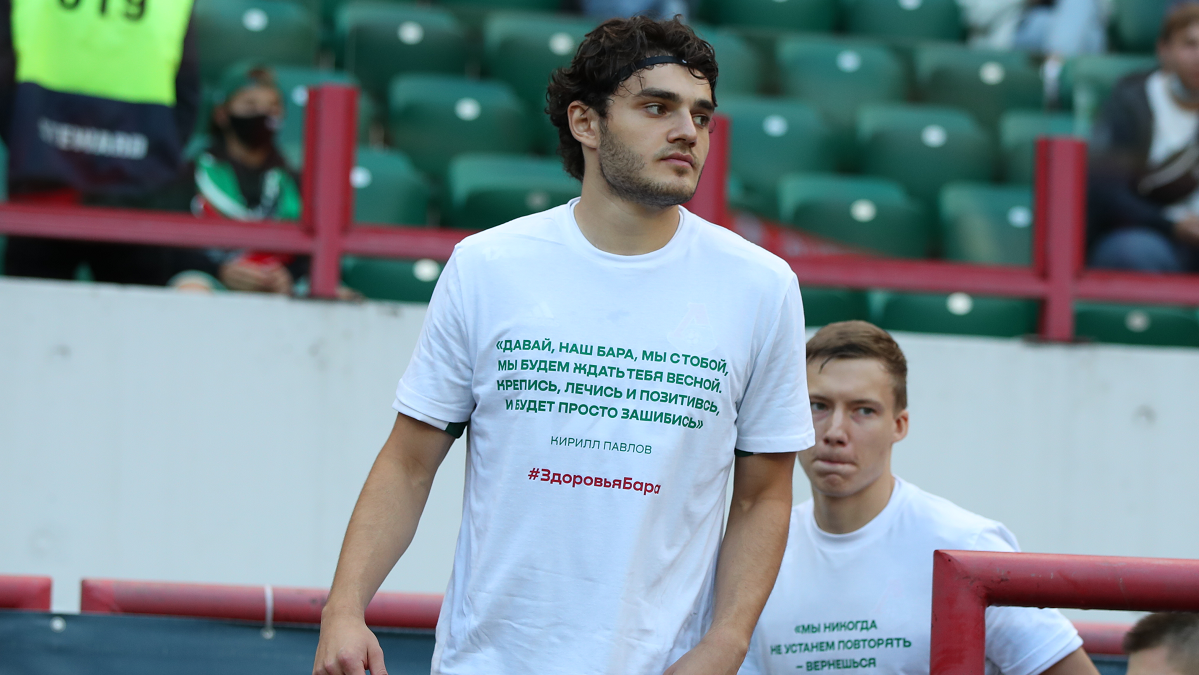
I don't talk to other colleagues who run social accounts of RPL clubs, but mostly with friends from CSKA basketball, Ak Bars hockey, and the guys from the league itself. However, before the derby, Vanya Korzh from Spartak suggested arranging a mini-battle, and I agreed. What exactly would be was not discussed; he posted something, and I answered in my interpretation. It was a small shootout, without any insults. I don't like such previews, because if you play badly in a match, you will be remembered later. We exchanged tweets with Spartak not with a desire to tease each other, but to warm up interest in the upcoming derby.
Вызов принят ✊????
— «Локомотив» (@fclokomotiv) August 23, 2020
Слово предоставляется @cherdantsev ???? https://t.co/3Lls1z13c0 pic.twitter.com/zrtyAJcCNi
In order for a joke not to turn into an insult, you need to think sensibly yourself. Everything depends on the suitability of the person who leads the account. I discuss such moments with Kirill Breydo to make it look decent. You need to turn on the internal control in time.
“Social networks are creative, and they should have their own style”
There is always room to grow, including Lokomotiv's social networks: visualisation, more active communication with fans, more videos, beautiful photos – it's just a matter of resources and implementation. We try to make the most of the available resources. Sometimes, a creative idea appears and everything turns out super, and sometimes, ideas do not turn out how you hope. It is impossible to sit and generate ideas 24 hours a day, we are all human. When there is a constant brain process, periodically you need to restart. I am always ready to improve something, and if there is such an opportunity, I will be ready for it, because we need to develop. Social networks do not stand still, you need to keep up with them. They constantly have something new that you can use.
For example, we recently created an account in TikTok, which is handled by Guzel. This platform is very different from other networks in how the user is given content. You just promote the team among people who are not interested in football at all, and if the content is cool, they notice it and find out that there is such a football team. TikTok, of course, has a crazy algorithm, but in terms of increasing brand awareness, this is quite a useful mechanism.
I used to be asked where I learned to work with social networks, and said: “Well, anywhere.” Everything I know has come from experience, thanks to daily work, a constant search for something new, and noticing what other clubs or brands are doing. We didn't learn to walk from books either. First we fell and picked ourselves up many times, and then kept going. When I left Rubin and handed things over to my replacement, many things were very difficult to explain. They were clear to me, and I didn't even know how to answer some leading question, because there was no clear explanation. I did many things purely intuitively, without relying on any theoretical knowledge.
When you come out of nowhere to football, you still have to look at the work of others to understand how things work. I consider social networks to be creative, and here you should have your own style. Previously, everything was done under a carbon copy, and no one stood out anywhere. Now you can clearly see who stands out and where, and some teams clearly have their own style, more so when it comes to ideas than design.
Don't be afraid to do something new. Everything is already thought up, so it is very difficult to surprise by copying someone else. If no one is doing something, it doesn't mean that the idea is bad or that it's wrong. Be the first and do it! Then you can tell everyone. Many people think that social networks are easy: just learn to write correctly, and that's it. In fact, this is not the case. I came across guys who came to work on social networks, and when I told them that something could not be done, they looked surprised. Roughly speaking, this word should not be used, because it may be misunderstood in the current context. This understanding is one of the most important parts of the job: you can write without mistakes, but one wrong word will catch up with you later.
This is an interesting sphere, but to understand everything completely, you need to cook in it for at least a season. During this time you will understand whether or not you like and can do this business. Therefore, the main thing is that I advise those who want to engage in social networks in the future to do is to be inspired, but not to copy, and most importantly, not to be afraid to do something new.”
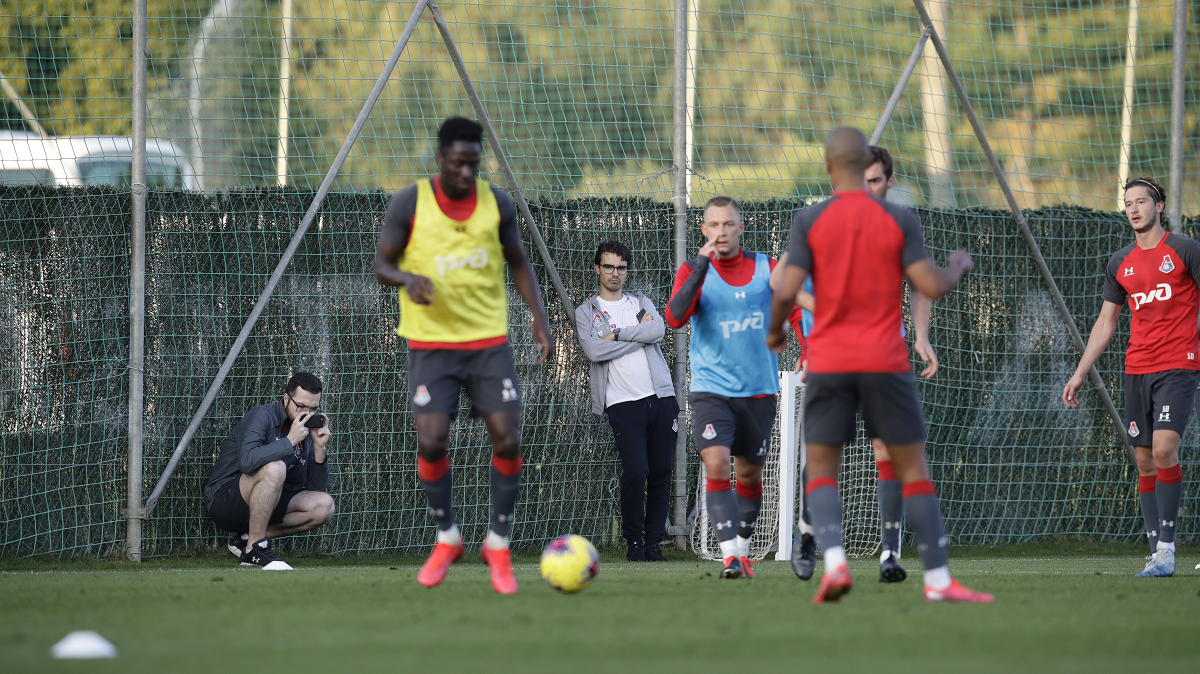
Photos: Timur Bayramov; Konstantin Rybin/RPL; Dzhalil Gubaydullin/Rubin Kazan; Aleksandr Pogrebnyak/Lokomotiv Moscow
 Российская премьер-лига
Российская премьер-лига
 News
News 

